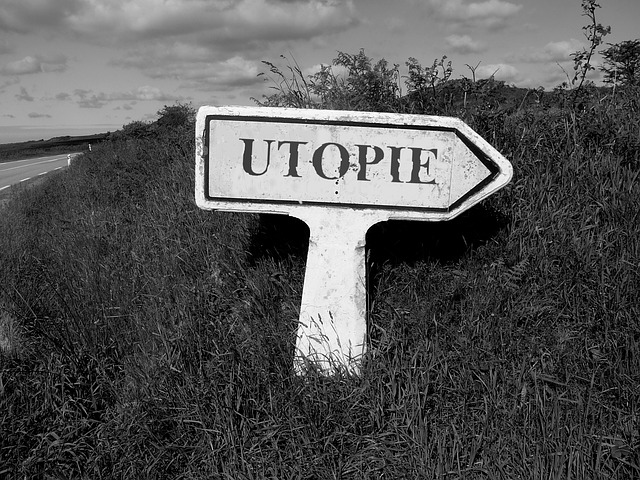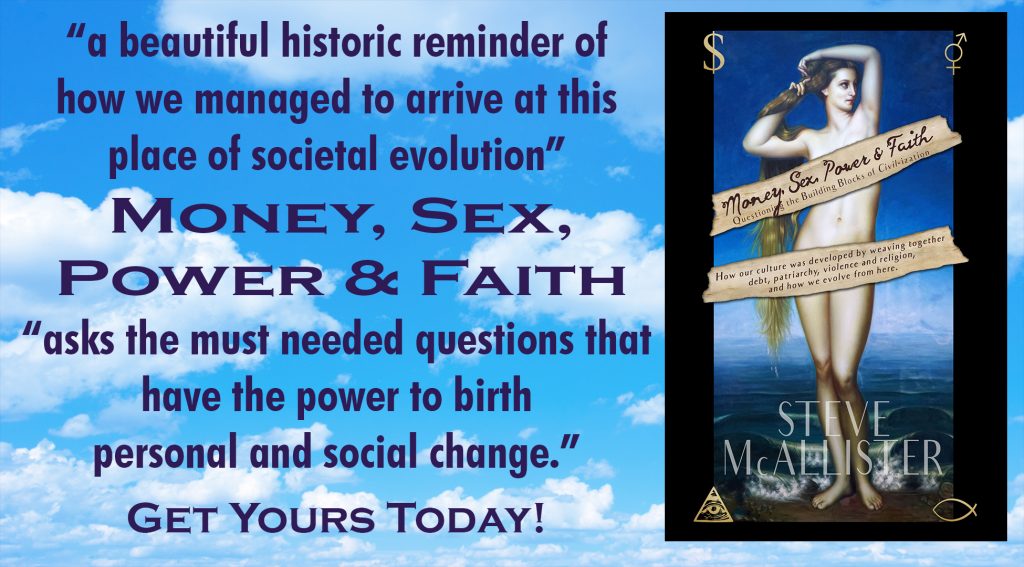The following is a chapter from Money, Sex, Power & Faith.
Order your copy in paperback or for Kindle!
“Human beings will be happier – not when they cure cancer or get to Mars or eliminate racial prejudice or flush Lake Erie, but when they find ways to inhabit primitive communities again. That’s my utopia.” – Kurt Vonnegut
 As Europeans were making their way to the New World, planting tobacco and planting the seeds for the world we know now, seeds were being planted in Europe as well. In opposition to the King of England’s separation from the Roman Catholic Church, Thomas More, inspired by the stories of the New World travelers, wrote a book in Latin about a fictional island discovered there where people were developing an alternative society called Utopia. Although many of the ideas offered up in the book, which actually had a much longer Latin title, were out of alignment with More’s traditional Catholic beliefs, such as divorce, married priests, and such, those ideas were largely overshadowed by the differences from the mainstream economic ideologies of the time.
As Europeans were making their way to the New World, planting tobacco and planting the seeds for the world we know now, seeds were being planted in Europe as well. In opposition to the King of England’s separation from the Roman Catholic Church, Thomas More, inspired by the stories of the New World travelers, wrote a book in Latin about a fictional island discovered there where people were developing an alternative society called Utopia. Although many of the ideas offered up in the book, which actually had a much longer Latin title, were out of alignment with More’s traditional Catholic beliefs, such as divorce, married priests, and such, those ideas were largely overshadowed by the differences from the mainstream economic ideologies of the time.
First printed in 1516, Utopia described a world in which there was no private property and everything was shared, a far cry from the fervor of materialism that had been building throughout the Renaissance. Sharing the agricultural duties, rotating homes once a decade, no locks on the door, and six hour work days were just a few of the ideas that started to paint a really rosy future for a world yet to come. More’s basic gist was that a communal life based on reason was the only way to improve upon the selfishness, greed, and corruption that made the European aristocracy so inefficient.
More became the head Chancellor of Parliament and one of Henry VIII most trusted advisers. However, things between them became rather stilted when More couldn’t support the King’s desire for an annulment from his first wife to marry another, and the King had him “mercifully” beheaded. Utopia wasn’t published in More’s home country until five years after his death, but its popularity forever changed the human vernacular and inspired a slough of fiction based on a utopian view of the future where everything works out all right, and dystopian versions where things go all kinds of wrong.
As it was read throughout Europe and into the New World, Utopia offered a reflection of the future where humankind was egalitarian and free of war. In addition to inspiring an entire genre of fiction based on the future outcome of civilization, Utopia was also largely cited as an inspiration for the movements of communism and socialism that would sprout up a few centuries after its publication. However, it may have been King Henry himself who set the stage for the government’s role in the redistribution of wealth and the socialist state.
Though some see Utopia as nothing more than a pipe dream, should that be enough reason to enable the status quo?
Order your copy of Money, Sex, Power & Faith today!


